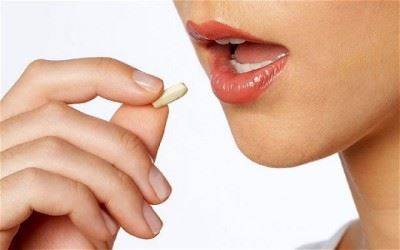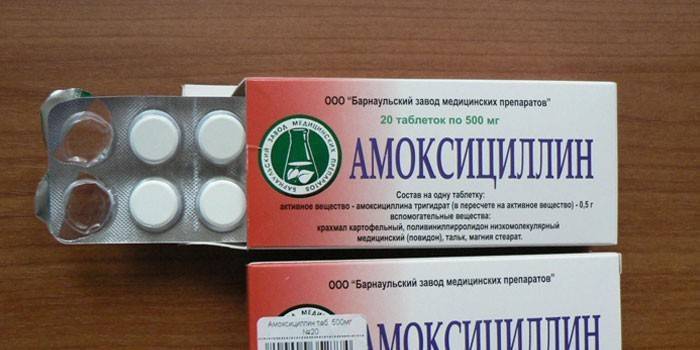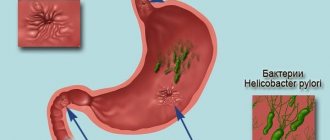Are antibiotics needed for gastritis?
Before prescribing medications, an instrumental and laboratory examination of the patient is carried out.
The main thing in diagnosis is the identification of Helicobacter pylori, which causes the development of gastritis and stomach ulcers. The pH level, the condition of the mucous membrane and the degree of its damage are also determined. The presence of Helicobacter pylori is an indication for the inclusion of antibacterial drugs. Therefore, taking antibiotics for gastritis and ulcers is a mandatory direction of therapy. Inflammation of the stomach is treated according to regimens that are developed taking into account the sensitivity of the pathogenic bacterium to antibacterial drugs. Symptomatic treatment reduces acidity and helps restore the mucous membrane.
Why are antibiotics combined to treat gastritis?
Currently, experts recommend treating stomach inflammation and ulcerative processes with several medications at the same time.
Eradication regimens are represented by the following groups of drugs:
- antibacterial agents;
- proton pump inhibitors;
- bismuth subcitrate preparations.
In order to eliminate Helicobacter pylori, two antibiotics are required. This is due to the peculiarity of the life activity of the bacterium. The pathogen has the ability to form biofilms, as well as change from a spiral shape to a coccal one. Thus, the body’s immune response to the introduction of a foreign agent is reduced and the microbe becomes resistant to the effects of drugs. Two drugs with antibacterial activity are needed to kill a bacterium, one is not enough.
Proton pump blockers reduce the secretion of hydrochloric acid, promote regeneration of the mucous membrane and quickly eliminate unpleasant symptoms. Therefore, it is necessary to take antibiotics for gastritis with Helicobacter pylori together with Omeprazole.
Attention! It is important to take the pills according to the course of treatment prescribed by the gastroenterologist. Because with long-term use of proton pump blockers, there is a risk of developing atrophic gastritis
Which antibiotic is better for gastritis?
Antibacterial therapy includes drugs of different chemical groups. When prescribing a regimen, the doctor focuses on the patient’s allergy history and specifies which medications were previously used to treat diseases of the digestive tract.
The rules for taking antibiotics for gastritis and stomach ulcers are based on the principle of step-by-step care, which takes into account the characteristics of the pathogen. Therefore, the choice of a medicinal substance is carried out according to strict indications and takes into account all the listed criteria.
What is the difference between antibiotic treatment for gastritis and stomach ulcers?
For inflammatory diseases of the stomach and duodenum, the determination of Helicobacter pylori is a necessary study. Because the result of the analysis influences the choice of treatment method.
Antibiotics for gastritis and ulcers are always prescribed if the qualitative analysis is positive. The eradication therapy protocol for identifying the pathogen is identical for various morphological forms of the pathological process, taking into account the same etiological factor. This means that for stomach ulcers and gastritis, the principle of antibacterial therapy is the same.
Treatment with folk remedies
What are the most effective folk remedies to use to treat the bacterium Hilobacter pylori? There are many recipes, choose the one that seems most interesting to you.
Propolis
For treatment, many use a popular beekeeping product - propolis. It has antibacterial properties, therefore reduces the activity of pathogenic microorganisms. In addition, it contains many vitamins and beneficial microelements, which helps strengthen the immune system. Treatment with propolis is most effective if you choose among other folk remedies, because it also fights Helicobacter pylori, and at the same time strengthens the body’s defenses, reviews about it are the best.
How to treat with propolis?
Berries and healthy vegetables
Don’t want to take medications, especially strong ones like antibiotics? But it can be difficult to cope without them; nevertheless, the Helicobacter pylori bacterium is quite strong. It is worth considering the use of natural antibiotics, such as proanthocyanidin. This substance with a complex name is found in cranberries, so this berry successfully copes with viruses and harmful bacteria. You can eat fresh berries or drink fruit juice made from them. But talk to your doctor first. Cranberry juice is highly acidic, so during exacerbations of the disease it can be harmful. It should not be taken if you have gastritis or stomach ulcers. It is better to use this remedy to prevent the disease.
Beetroot juice is often used for treatment. It has healing properties, and also gently envelops the stomach, soothes it, and relieves pain. But it needs to be prepared correctly:
- Extract the juice using a raw vegetable.
- Leave it in an open container for 2 hours.
- Dilute with water in a 1:1 ratio.
- Drink diluted juice before meals, 100 ml.
There are other folk remedies that help with illness. This includes cabbage juice, which is squeezed from fresh leaves of the vegetable (drink 100 ml, but not for gastritis), or pain-relieving potato juice, which is also drunk in half a glass before meals.
Herbs
- A decoction of various herbs. Before use, make sure that they do not harm your health, read about contraindications. These are peppermint (leaves) and yarrow (flowers) - 15 g each, dill seeds - also 15 g, 2 g of bean, and 30 g of the famous herb - St. John's wort. All this needs to be mixed. Measure out 2 tbsp. mixture and pour 2 tbsp. boiling water Then leave to infuse for 2 hours, then strain and drink a few sips at a time, spreading it throughout the day.
This bacterium is quite tenacious, so it is difficult to fight it, but if you use folk remedies, a person’s well-being can significantly improve, and when the body’s defenses are restored, Helicobacter pylori will not bother you
Other recipes
There are many more recipes that allow effective treatment of Helicobacter with folk remedies, but preference should be given to the simplest and most accessible:
- It is recommended to use pumpkin seeds . You should grind them in an amount of 100 grams, add 100 grams of wormwood. The resulting mixture is poured with a liter of high-quality vodka. The product must be infused in the dark and warm for a week. Take it in the morning and evening hours, a single dose is one large spoon. In this case, contraindications should be taken into account: this tincture should not be taken by those who have ulcerative pathology.
- You can mix the juice squeezed from potatoes in a volume of 50 ml with the same amount of fresh blackcurrant juice; you need to take 100 ml of it in the morning and evening hours.
- If there is low acidity, you can make a medicine from plantain. Thoroughly washed leaves of the plant are crushed, the juice is squeezed out, and a large spoonful of the ingredient is mixed with 100 ml of warm water. Drink the product half an hour before each main meal.
- You can use calamus root by crushing it and brewing four large spoons of the ingredient in a liter of boiled water. After infusion and filtering of the product, it must be taken before main meals. A single serving is 0.5 cups.
It is necessary to understand that any folk recipe should be used as an additional treatment and used against the background of diet and taking pharmaceutical drugs. In addition, before taking such drugs, you should consult a specialist.
Forms of flow
Helicobacter pylori (the treatment regimen will allow you to act directly on the causative agents of the disease) is classified as follows:
| Name | Description |
| Hidden (latent) | An infected person is a carrier of pathogenic microflora. The pathogen is present in the stomach, but does not show activity. There are no clinical signs. The disease can last for years in a latent form. Pathological processes can be activated by weak immunity, food poisoning, intestinal infection, poor diet or constant stress. |
| Acute | A severe inflammatory process in the stomach develops due to the accumulation of a large number of pathogenic bacteria. Increased proliferation of pathogenic microflora leads to pain in the upper abdomen. The person also experiences severe nausea and vomiting. |
| Chronic | It develops if the treatment for the acute form of helicobacteriosis was incorrectly selected. The chronic form of the disease also occurs when the mucous membrane is poorly colonized by pathogens. A person experiences minor disturbances in the functioning of the gastrointestinal tract. Severe nausea, belching, heartburn, and heaviness in the stomach occur. An inflammatory process develops, which is accompanied by a burning sensation in the esophagus and bleeding gums. |
In any situation, properly selected therapy is necessary, since pathological processes will progress. There is a high probability of developing a peptic ulcer, especially against the background of acute or chronic helicobacteriosis.
What diseases can be caused by H. pylori
The presence of H. pylori in the stomach is not a disease in itself. However, these bacteria increase the risk of developing various diseases of the digestive tract.
Although colonization of the gastric mucosa by Helicobacter causes histological gastritis in all infected individuals, only a small proportion of them develop clinical symptoms of this disease. Scientists estimate that 10-20% of people infected with Helicobacter pylori develop ulcers, and 1-2% develop stomach cancer.
Diseases the development of which is associated with Helicobacter pylori infection:
- Gastritis is an inflammation of the gastric mucosa. Soon after infection with H. pylori, a person develops acute gastritis, sometimes associated with dyspepsia or nausea. An acute inflammatory process affects the entire stomach and leads to a decrease in acid secretion. After a certain period of time after acute gastritis, chronic gastritis develops.
- Ulcer of the stomach and duodenum. According to scientific data, 70-85% of all stomach ulcers and 90-95% of all duodenal ulcers are caused by bacteria
- Functional dyspepsia is pain in the upper abdomen that is not caused by an ulcer or other stomach lesions. Scientific research has shown that some types of dyspepsia are associated with infection. Treatment to eradicate the bacteria provides relief for many patients with functional dyspepsia and also reduces the risk of developing stomach ulcers and cancer in the future.
- Stomach cancer. Helicobacter pylori is a scientifically recognized etiological factor in the development of stomach cancer. According to one hypothesis, bacteria promote the production of free radicals and increase the risk of mutations in stomach cells.
- MALT lymphoma of the stomach. The infection's association with this disease was first reported in 1991. This bacterium is believed to cause 92-98% of gastric MALT lymphomas.
Treatment of Helicobacter pylori
Like any bacterial infection, Helicobacter pylori requires treatment with antibiotics. But antibiotics themselves can cause no less harm to the body than an insidious bacterium. Therefore, drugs are prescribed only if helicobacteriosis poses a greater threat than an antibiotic. If there are significant (only a doctor can decide) ulcers and erosion of the gastric mucosa or diseases that have developed on the “fertile” soil of advanced helicobacteriosis, an antibacterial course is necessary. In other cases, drugs are sufficient to restore the mucous membrane of the stomach walls. Folk remedies for normalizing gastric juice will also be useful.
The treatment regimen for Helicobacter pylori usually includes at least three different drugs, which are selected individually for each patient
It is important to follow the entire course and not give up treatment, otherwise the remaining “saboteurs” will hide for a while and may return again. In addition, while taking antibiotics, bacteria “get used” to the medicine, and next time they may need another, stronger drug, which will definitely not benefit the body.

An indispensable condition for treatment is maintaining a correct lifestyle:
- giving up bad habits (smoking, drinking alcohol);
- transition to a gentle diet (in the future, proper nutrition);
- If possible, a calm course of life (avoid worries, stress, negative impressions).
The biggest problem from Helicobacter pylori occurs when patients self-medicate. The fact that the prescribed course of treatment helped a friend, brother, or matchmaker does not mean that these drugs will bring recovery to the sick person himself. On the contrary, a person can convince himself that he is already completely healthy and ignore pain symptoms, attributing them to poor nutrition or stress. In the meantime, Helicobacter pylori will continue its destructive activities, leading to very sad consequences.
Some folk remedies normalize stomach acidity, create protection against Helicobacter pylori on the mucous membrane, and relieve pain and discomfort. They can be used as an adjunct (precisely an adjunct) to drug treatment.
Causes of Helicobacter pylori in the stomach
Knowledge about where Helicobacter pylori comes from and the causes of the bacteria is necessary for everyone. They will help prevent microbial contamination and avoid infection. Forewarned is forearmed.
The source of infection is humans. He may have clinical symptoms of the disease, or he may be a carrier of a pathogenic microorganism and not even know it. In many cases, the infection is asymptomatic and is not accompanied by changes in health.
The microbe is very tenacious and extremely contagious. If one family member is diagnosed with this infection, then with a 95% probability all persons living with him will also be infected.
The bacterium is easily transmitted through saliva through kissing, sneezing, using shared cutlery, towels, failure to comply with personal hygiene rules, and when eating foods contaminated with H. pylori (if you have the habit of eating from the plate of an infected family member, or finishing his food).
You can become infected with the pathogen again, using the same methods, even after successfully completing a course of eradication and negative tests for the presence of this microbe. The cure does not occur for life; the body does not develop immunity to the toxins of a given microorganism and to itself.
Methods and routes of infection with Helicobacter pylori:
- kissing a sick person/carrier
- eating food contaminated with bacteria
- insufficient adherence to the rules of personal hygiene in the family circle (one toothbrush for two, shared towels), where there is an infected person, or in a close group of people (shared lipstick, borrowing a neighbor’s handkerchief)
- sharing cutlery and reusable dishes with an infected person
- insufficient disinfection of spatulas, endoscopic and dental devices in medical institutions
- particles of saliva from an infected person getting on the mucous membranes of a healthy person when sneezing or coughing. This method of infection is still under study.
The bacterium, having entered the body using one of the methods described above, reaches the stomach and can be in a latent, dormant state (in this case, the person is called a carrier), or cause diseases of the gastrointestinal tract, allergic reactions, or weaken the immune system.
Symptoms and signs
It is impossible to find out about the presence of this bacterium in the body by identifying symptoms alone. Because a very large number of digestive problems fit the description of these symptoms or have similar symptoms.
Many people simply do not pay attention to the manifestations of symptoms, this is undoubtedly a minus, because when you detect alarm bells in your body, the first thing you need to do is go to a doctor for an examination, in this case a gastroenterologist. If the cause of the problem turns out to be a bacterium, all your friends and especially relatives are at risk of infection.
If the cause of the problem turns out to be a bacterium, all your friends and especially relatives are at risk of infection.
Let's look at the main symptoms and signs that a person has become infected with Helicobacter pylori:
- Belching. Unfortunately, many people do not perceive this symptom as dangerous at all. If you regularly burp after eating, this is not a good sign of a healthy condition. Especially when at the same time a rotten smell and unpleasant taste comes out of the stomach;
- Abdominal pain. The nature of the pain can be completely different in different parts of the abdomen. If your stomach hurts at a certain time, for example, on an empty stomach or after eating, you should consult a specialist and undergo all the necessary tests. With constant use of painkillers, you can harm yourself and complicate the situation;
- . Of course, individually, these signs can be present in many people. However, they can be an indicator of serious illness. If you have severe flatulence and other signs are present, consult a doctor immediately;
- Vomiting and nausea. Such phenomena are considered normal if they occur for obvious reasons, for example, toxicosis during pregnancy, or during poisoning. In other cases, these factors may mean that stomach problems are quite serious. If you experience periodic vomiting without any explanation, rush to see a doctor;
- Blood in vomit or stool. This symptom is definitely the most serious and does not even require an explanation why. As soon as you start to notice blood or the stool turns black, this may indicate internal bleeding. With such manifestations, you need to urgently call an ambulance.
- Disorders of the gastrointestinal tract. If you have frequent constipation, diarrhea, and you cannot find the cause of their occurrence, most likely it is helicobacteriosis.
Helicobacter pylori - treatment
If you respond to alarming symptoms in time, you can cure this disease and provide reliable and affordable prevention of active bacteria. If you listen to your doctor, the treatment regimen for Helicobacter pylori includes taking antibiotics, using agents to restore the affected mucous membrane, a therapeutic diet, and vitamins for the immune system. It’s worth clarifying right away that this bacterium is highly resistant to many antibiotics, so superficial self-medication is completely excluded.
Eradication of Helicobacter pylori
If a bacterium is detected, a set of medications and procedures are prescribed to quickly stop further development. This eradication therapy of Helicobacter pylori is highly effective with the correct choice of antibiotics and has a number of significant advantages. Before treating Helicobacter pylori infection in the stomach, it is necessary to select the optimal regimen. More often it looks like this:
- Antibiotic Clarithromycin for 7 days.
- Antibacterial drugs Tinidazole, Trichopolum, Amoxicillin for a weekly course.
- Proton pump inhibitors Rabeprazole, Omez for a week.
Since the body develops increased resistance of pathogenic flora to antibiotics, it is not easy to get rid of pathogenic bacteria with antibiotics. It is necessary to first perform a test for sensitivity to the drug, take the full course for Helicobacter, and not violate the prescribed sequence of actions.

How to treat Helicobacter pylori with medication
Doctors first determine the cause of the pathological process, then eliminate it and prescribe effective treatment. If treatment for Helicobacter pylori is started untimely or is prescribed incorrectly, serious complications that occur in the human body may follow. Below are the most common medical directions against Helicobacter pylori:
- Eradication, combining in one prescription three medications Amoxicillin, Rabeprazole, Clarithromycin.
- In the absence of a sustainable therapeutic effect, it is indicated to replace these medications with Rabeprazole, Metranidazole, Bismuth subsalicylate, Tetracycline.
- Oral intake of probiotics is mandatory for the speedy restoration of the epithelium of the mucous membrane.
Diet for Helicobacter pylori
Special requirements are indicated only for internal bleeding; in other clinical situations, nutrition should be complete, balanced, and healthy. The diet for Helicobacter pylori is aimed at maintaining digestive functions and speedy restoration of the affected gastric mucosa
If Helicobacter pylori progresses, it is important to find out what kind of bacterium it is first, and only then will you have treatment and a diet that excludes the following foods from your daily diet:
- alcohol;
- fatty and fried foods;
- smoked meats and preserves;
- confectionery;
- spices and pepper;
- mushrooms and first (fatty) broth;
- coffee Tea.
If you have Helicobacter, you are allowed to consume low-fat soups, milk porridges, lean meat and fish, vegetables, milk and berry smoothies, and medicinal decoctions. With a properly planned menu, the manifestation of a relapse will be relegated to the background, and the number of pills consumed will be reduced several times. At home, you can always use alternative medicine recipes against dangerous bacteria.

How to take propolis against Helicobacter pylori ↑
Typically, the dose is determined based on the person's condition and priority goals. If prevention is required, then it is enough to take a solution of warm water and five drops of propolis tincture daily. This can be done for 2-4 weeks, which will improve your general condition and also help reduce the risk of infectious diseases. Reviews from people for whom such prevention is permanent indicate a significant improvement in the general condition of the body and the rare occurrence of seasonal, viral and other diseases.
If treatment of small children is being considered, then propolis should be used in water; tincture with vodka or alcohol is contraindicated. A good alternative would be to simply chew propolis, if you can persuade the child to do so.
Diagnosed Helicobacter pylori should be treated for more than one week. To do this, take 10 drops of propolis tincture diluted in a glass or 100 grams of warm water or milk daily. This should be done 40-50 minutes before meals, three times a day. Reviews from many people also say that their appetite improves after taking this solution. The course lasts a month and will be quite effective if the disease is diagnosed in a timely manner, the diet is followed, and there are no consequences in the form of developed gastritis or ulcerative pathologies.
Tincture with propolis is freely sold in specialized outlets, pharmacies, including online resources. Before purchasing, it is important to verify the quality of the product, look at the expiration date, information about the manufacturer, and study reviews. If it is possible to obtain natural propolis, then the tincture can be easily prepared at home, but you must follow the preparation technology.
Helicobacter pylori must be treated in a timely manner, a diet must be followed, then you can get by with therapeutic measures that are gentle on the body. You can get rid of these microbes in the shortest possible time and protect your digestive system from negative consequences. We must not forget about accuracy and hygiene rules, which will help reduce the risk of infection. Contacting a specialist and taking the appropriate tests will help establish a diagnosis, and only after this, as well as consultation with a specialist, can you practice traditional methods, including treatment with propolis.
Author: Maria Filonova
Forms of the disease
There are 2 types of helicobacteriosis:
- Hidden form. Most often, the patient does not even suspect the presence of infection, since there are no signs. This is mainly explained by a fairly strong immune system, which leads to the fact that pathogenic organisms enter an inactive phase. However, when favorable conditions are created, they can begin to actively reproduce.
- Helicobacter may be the culprit of gastritis or ulcers, the acute stage of which later becomes chronic. By the way, it is the deep-rooted disease that is one of the main symptoms of helicobacteriosis.
Even in the absence of signs, Helicobacter pylori harms the condition and functioning of the gastrointestinal tract.
Symptoms
Typically, a pathogenic bacterium makes itself known quite clearly.
It's time to think about the treatment of helicobacteriosis:
- For pain localized in various parts of the abdomen, including behind the sternum. As a rule, pain occurs in the late evening and after meals. However, with an ulcer, pain appears on an empty stomach, and goes away after eating.
- With frequent belching (the patient feels a sour taste and smell of rotten eggs from the mouth).
- Frequent flatulence and problems with stool also become a signal of a problem. With Helicobacter pylori infection, constipation for up to 48 hours and regular stomach upsets are observed.
- Another reason is difficulty swallowing food and liquids.
- Do not ignore the presence of blood and mucus in stool and vomit.
- In addition to frequent nausea and vomiting, pressure is felt in the epigastric region.
- Lack of appetite and weight loss for no apparent reason.
In some cases, pink pimples on the face may indicate the presence of Helicobacter pylori infection.
How is diagnostics carried out?
If you suspect the presence of the Helicobacter pylori bacterium, the following examinations must be carried out:
- Stool test for Helicobacter Pylori antigen. In most cases, laboratory technicians find particles of bacteria in the stool, which gives every reason to believe that their colonies populate the gastrointestinal tract.
- Blood test for antibodies. This diagnostic method cannot be called 100% accurate. The fact is that even after suffering a Helicobacter pylori infection, antibodies tend to persist for a long period of time.
- One of the best diagnostic methods is a breath test. Its advantages are high accuracy and low cost. However, it must be remembered that if the preparation rules are not followed, you can get a false result. To increase reliability, half a month before the diagnosis, you need to stop using antibiotics, anti-inflammatory drugs and a number of other drugs. And 3 days before the procedure, avoid drinking alcoholic beverages and smoking. Stop drinking caffeine-containing and carbonated liquids one day before.
- Often, in case of a stomach ulcer and suspicion of another disease of the intestinal tract, an endoscopic examination is prescribed. During this process, a biopsy is taken - a small sample of the mucous membrane.
Feedback from doctors and their patients suffering from infection suggests that you should not rely on the results of one diagnostic method. To be on the safe side, specialists prescribe several examinations at once.
List of drugs required for therapy
The list of medicines includes several groups:
- Drug therapy involves the prescription of bismuth preparations (for example, De-nol). However, there are treatment regimens where these drugs can be dispensed with.
- The antibiotics themselves. Most often, domestic doctors prescribe: Augmentin, Flemoxin, Klacid, Ormax. Combination treatment with two types of antibiotics is possible (usually if bismuth preparations are not prescribed).
- Antisecretory drugs: Ranitidine, Omez, Lansoprazole, Gastrocepin and others.
- Antimicrobial medications (if necessary) - for example, Macmiror.
- Enzyme preparations (Mezim, Pangrol, Creon) are prescribed to improve digestion and relieve excessive stress on the pancreas. Most often, treatment of gastrointestinal diseases accompanied by the presence of Helicobacter pylori infection cannot be done without them.
- Antibiotic therapy is necessarily accompanied by the use of lacto- and bifidobacteria (Bifiform, Linex, Acepol) to normalize intestinal function and (or) means to prevent the occurrence of candidiasis (Fluconazole, Nystatin, Pimafucin, etc.).
In most cases, the outcome of drug therapy cannot be predicted. This is explained by the bacteria's resistance to drugs. After all, many people uncontrollably take antibiotics to treat all sorts of ailments. However, when combined therapy is prescribed, the result is positive in most cases. In difficult situations, it is possible to take tests to determine the sensitivity of the H. Pylori bacterium to certain antibacterial agents.
There is currently no vaccine against Helicobacter pylori. Nevertheless, several years earlier, the best scientists in the world began to develop a vaccine. Experts wanted to ensure that the drug could be taken during meals. However, identifying a product that would be effective in acidic conditions has proven problematic.
Example of a treatment plan
Since the most common antibiotic treatment regimens for Helicobacter pylori infection include taking two main medications, the doctor will most likely suggest you take De-nol in combination with another antibiotic he prefers or the Klamox + Claricin regimen.
Only your attending physician can recommend the exact types of medications that are right for you, the dosage and duration of treatment. Don't self-medicate!
Bismuth preparations against Helicobacter
This treatment regimen for Helicobacter pylori with antibiotics is most often used. The doctor prescribes one antibacterial drug and its complementary agent.
What medications are these? Clarithromycin or Tetracycline. Both medications must be taken twice daily. The average dosage for an adult is 0.5 g. A proton pump inhibitor or a histamine receptor blocker (Cimetidine or Roxatidine) is also taken. The exact dosage is prescribed by the attending physician.
Antibiotic therapy
What antibiotics are used to treat Helicobacter? Most often, one type is prescribed (Amoxicillin, Tetracycline, etc.) and two additional drugs (Famotidine, Quamatel or Ranitidine). The course of antibacterial medications according to this regimen lasts at least 10 days.
In this case, the specialist has the right to increase the dosage of the funds and change the two-time dose to four times a day.
Additional medications
Analyzing the third treatment regimen for H. Pylori with antibiotics, it is worth noting that it is combined. That is, it implies the simultaneous use of two antibacterial and two additional drugs. In addition, proton pump inhibitors and histamine receptor blockers are used.
A specialist may also prescribe Venter or Misoprostol. These medications protect the walls of the stomach from the aggressive effects of hydrochloric acid.
During the treatment period for Helicobacter, the doctor prescribes vitamins and prebiotics. After all, it has long been known that antibacterial drugs kill both pathogenic microorganisms and beneficial ones.
Traditional methods of therapy
When symptoms appear, it is unacceptable to select therapeutic agents and methods on your own.
Considering that antibiotics are used in the treatment of Helicobacter pylori, only the attending physician should prescribe them.
Medicines are selected in such a way that the least possible harm is done to the body. If the harm from the use of drugs is greater than the expected benefit, it is possible to refuse antimicrobial drugs.
If erosions and ulcers are found on the mucous walls, drug treatment is necessary, since without it it is impossible to completely restore the damaged organ. It is impossible to treat Helicobacter pylori infection without antibiotics if ulcerative pathology, atrophic gastritis or oncological lesions have formed.
The use of antimicrobial drugs is necessary not only during exacerbations, but also during remissions. Practice has proven that the most effective treatment regimen for Helicobacter pylori bacteria should include at least three pharmaceuticals: two antibiotics, selected individually, and a proton pump inhibitor. The duration of the course of therapy is two weeks. Significant relief occurs quite quickly, but therapy cannot be interrupted . Otherwise, pathogenic microorganisms may adapt to the agent used, and treatment will have to start from the beginning.
In addition, the presence of this bacterium in the body suggests a review of lifestyle. Taking pharmaceuticals is carried out against the background of giving up bad habits, and a diet is also prescribed aimed at reducing the load on the gastric walls.
Traditional treatment methods
With low acidity
Before choosing a medicine for the treatment of Helicobacter pylori and the gastrointestinal diseases that arise from it, you need to know the acidity of the stomach. In addition to the acidity test performed during FGDS, low acidity can be determined thanks to the following symptoms:
- heaviness;
- pain, especially after a meal;
- bad breath, similar to rot;
- bloating and flatulence;
- skin problems.
How to cure Helicobacter pylori in this case? Traditional medicine recommends using plantain, cabbage and calamus root. Below are the most popular and effective treatment methods:
- Squeeze the juice of white cabbage and take 100 ml 1 hour before meals. The drink strengthens the gastric mucosa, heals ulcers and eliminates inflammation.
- Take a tablespoon of freshly squeezed plantain leaf juice half an hour before meals. If you are not sure that you can drink the juice in its pure form, then dilute it with 100 ml. warm water.
- Chopped calamus root in the amount of 2 tbsp. l. pour 200 ml. boiling water Leave in a warm place for half an hour. After this, strain the drink through cheesecloth and drink half a glass 30 minutes before starting a meal.
The main components of these decoctions will help normalize acidity and eliminate symptoms.
With increased acidity
High acidity due to the presence of Helicobacter bacteria in the body can be treated with folk remedies if the following symptoms are present:
- discomfort in the esophagus after eating;
- heartburn;
- change in taste preferences;
- loss of appetite;
- intolerance to acidic foods.
In this condition, potato juice, flaxseed, and herbal preparations will help get rid of Helicobacter pylori. The most popular recipes for traditional treatment are presented below:
- Pour half a glass of flax seeds 300 ml. warm water. Place on fire and bring to a boil. Boil for 7 minutes. Once ready, remove the mixture from the stove and leave for about 2 hours. After this, strain the resulting substance, which has a consistency similar to mucus. You need to take the medicine before meals or every time you have discomfort in the epigastrium. A single dosage is 1 tablespoon.
- Drink half a glass of freshly squeezed potato juice before each meal.
- The most effective herbal mixture is considered to be a mixture of chamomile, celandine, yarrow in combination with St. John's wort in equal proportions. To prepare a medicinal decoction you will need 4 tbsp. l. mixture and 1 l. boiling water Fill the herbs with water and leave for 9 hours. Take 1/3 cup before meals. The total amount of decoction drunk per day should be 1 glass.
For treatment with folk remedies to be effective, you must first consult with a gastroenterologist and under no circumstances replace antibacterial therapy with them.
The best option
There are times when a person does not know exactly his acidity level, and it is not possible to determine it. In this case, you need to arm yourself with universal folk recipes that have an enveloping effect.
- Take in equal proportions (1 tsp), honey, butter, cocoa powder, sea buckthorn oil and egg. You need to take the medicinal mixture before meals, 1 tsp.
- Beat egg white with 1 tbsp. l. powdered sugar and vegetable oil. You need to drink the cocktail on an empty stomach, after which you can start eating only after 2 hours. It is better to store the drink in the refrigerator.
These recipes are the most effective folk remedies for treating Helicobacter.
Diet for Helicobacter pylori
The diet in the presence of a pathogenic bacterium differs little from the usual measures taken for stomach diseases. First of all, avoid fried and fatty foods, smoked foods, spicy and sour foods. All dishes should be easily digestible, light, and not irritate the gastric mucosa. The selection of dishes is based on the patient’s condition, taking into account the individual characteristics of his body and the level of acidity of the organ. There is a list of basic principles that should be followed:
- When treating Helicobacter, foods and substances that irritate the mucous layer are removed from the menu.
- Food should be chewed long and thoroughly, without being distracted by foreign objects.
- Drinking regime is important . You should take at least two liters of water per day, but it is unacceptable to drink while eating. Liquid intake is carried out either half an hour before a meal, or 60 minutes after it.
- You should eat in small portions. Reduce portion sizes and reduce the intervals between meals to three hours. Thus, the number of daily meals should be 5 or 6 times.
- The diet must be followed for at least 30-45 days.
- It is necessary to take into account the temperature of the food served; it should not be too cold or too hot.
- The consistency of the dishes should be quite liquid; preference is given to pureed soups or pureed vegetables and boiled cereals.
- When selecting portion sizes, you must rely on your own feelings. There should be no feeling of complete satiety or a feeling of heaviness, otherwise the amount of food should be reduced.
As for products, fatty meats and fish, canned food and preserves, various sauces, spices, mushrooms and broths based on them, alcohol-containing drinks, soda, cheeses - both smoked and processed - are removed from the diet. They also refuse baked goods, ice cream, and coarse-textured vegetables and fruits.
Speaking about permitted food, preference is given to white “yesterday’s” bread, bagels, crackers, lean fish, and lean meats. In this case, the preparation of such products should be carried out by steaming; they can be boiled or baked. Vegetable or secondary broths are used to cook soups; you can also cook soups with milk. Eggs, dairy or fermented milk dishes, cereal porridges, durum wheat pasta, berries, walnuts, regular or herbal teas, natural honey and bananas are allowed.










